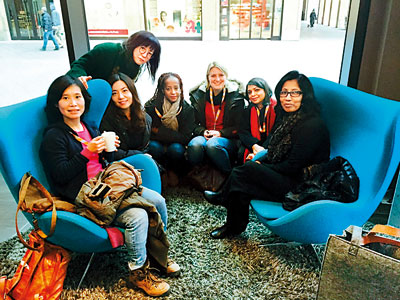Reel life of immigrants, refugees in the spotlight

Anoma Rajakaruna (far right) with other women directors and curators at the Berlinale
The Berlinale’s unique point is having many festivals within one festival. “The Berlinale is a film festival of many, many film festivals. It celebrates youth in the generations’ section, the future of cinema, of the Berlinale shorts and Berlinale talent campus. The first time awards given at the Berlinale open up the platform for debut film makers too. So it is a celebration of all forms of cinema,” says Anomaa whose participation was sponsored by the German Embassy in Colombo.
“At film festivals you meet a lot of people. This time at the 66th Berlinale International, my first time ever at this festival, I met a lot of programmers and curators: from Mexico to Brazil to Korea, from across the globe. When it comes to films especially, Asia and Europe are always connected – through festivals and the many interactions we have between the two continents.”
The Berlinale also recognized LGBTQ films (lesbian, gay, bisexual, transgender, and questioning) almost 30 years ago, by introducing the Teddy award for queer films.The celebration of alternative cinema in the forum-expanded section is very different to the focus of a mainstream film festival.
Stemming from a documentary background, Anomaa delighted in the festival focus this year: refugees and immigrant issues. “I really liked ‘Fire at Sea’ or ‘Fuocommare’ – a Ginafranco Rosi film. It’s about a little island – Lampedusa, in Italy, where two worlds are touching as Africans try to migrate to Europe. One wonders if it is a sort of meeting point or not? All these questions are addressed in the narration-less film with peoples’ narratives. Finally, it won the best film award at the Berlinale – a major feat for a documentary.”
“It was an unforgettable moment to see the digitally restored 2K DCP version of the silent film classic, Fritz Lang’s film Destiny, ‘Der Müde Tod’ a film made in 1921. We were watching it nearly hundred years after it first came out in the silent film era; and with the background score done live by the Radio Symphony Orchestra of Berlin.”
She was impressed by the support extended to film-makers in Germany. “There are many film schools in Germany. As a country, it is committed towards the next generation of filmmakers. National policies and working bodies encourage young people to make films and there is funding available for them. “The film ‘Oh Boy’, produced by a film school leaver won the national award at the German Film Awards. ‘Victoria’, another recent German film which has gained critical acclaim and international renown, is also by a film school leaver. A lot of film school productions have got major recognition at key international festivals,” said Anomaa.
“I have met filmmakers including from Sri Lanka who have been trying to mainstream their films for the last 10 – 12 years. But in Germany, you can study film making, leave film school, and access funding to make films. Then they have a system which looks after your films and it is easy to mainstream them. That’s why ‘Oh Boy’ and ‘Victoria’ are two fine examples of this system.”
“Countries and film festivals are committed towards a future. However, looking to the future tends to neglect the present and the past. “The Berlinale festival is committed towards looking back at their cinema and recognizing cinema as history. I see the commitment of the festival towards restoring, and recovering audio visual footage.”
“I gained mainly from the interactions at Berlinale. It helped to meet new people and decision makers from similar backgrounds of small festivals or big festivals and their curators and programmers. Sri Lanka can expect a lot of new films not only from Germany but from other countries to be screened at these. Currently, I am working with programmers from Africa, Brazil, Romania, a curator from South Korea, and a short film festival in Iran.” In the short term, a master class with a German filmmaker is being planned and some German debut films will be screened at the Jaffna Film Festival.
Anomaa says her experience at the Berlinale would not be complete without a word on women. “I have visited many film festivals and sometimes as a woman filmmaker and programmer, you look at 100 per cent male juries. I have sat at national and international juries, where women are tokens on jury panels. You have a long list of jurors and there is one token woman. It’s like the woman being the flower pot on the podium. But the Berlinale set a different example. There was 50% participation of women in the juries this year.”


